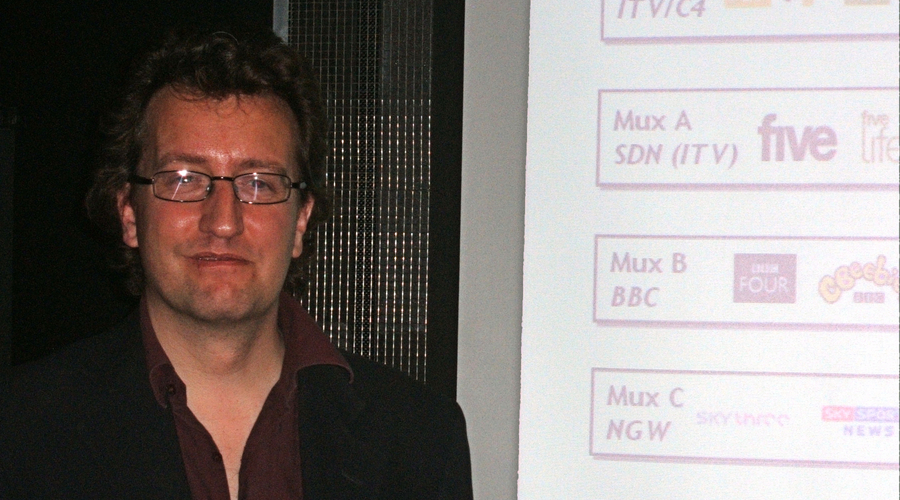I'm reliably informed that once you reach 35 you need to start concentrating a little harder to understand people when they tell you how technology will change in the future. Then, by the time you get to 50, you find yourself in "Don't see what the fuss is about W the penny-farthing was perfectly good for my generation" mode. [Editor's note: 15 years have been knocked off the true ages for literary effect]
But you mustn't let yourself fall for this W it's inevitable that the future will arrive all too soon, and without the technological breakthroughs of the past we'd never have had the rolling pin, the trolleybus and the non-stick iPod. After all, there's a plaque on Alexandra Palace which commemorates the start of "the world's first high-definition television service" on November 2nd 1936… and in those days 'high-def' meant 405-line B&W 4:3!
So the presentation at Newcastle College by Graham Plumb, the BBC's Head of Distribution Technology, about the transmission challenges of High Definition TV was a fascinating visit to a world of multiplexes and bandwidth W even if it was a little outside the experience of those who remember the miracle arrival of 625-line colour on BBC2 ("For those of you watching in black & white, the Red is behind the Pink")
Actually, HDTV is not the future W in America and Japan it's now. But if the UK is perhaps lagging a little behind them, it could be to the good W Britain has occasionally suffered in the past for being an early developer, only to see other nations improve on our experience, and benefit from it. And there can be no question that now that HDTV has been invented, it will soon come amongst us, and predictions are that by 2012 there will be 37m HD-ready sets in this country W more than one per household.
And they'll all want to receive a broadcast HD signal, the key to which is naturally Digital. The amount of detail required for HD could never be transmitted by analogue, and Graham's presentation concentrated not on the hardware, but on the unseen world of bits and bytes coming through the ether, and the complex juggling that his department (and its counterparts in other broadcasters and Ofcom) are having to do to get it all into the restricted bandwidth that is inevitably part of transmission.
There's not a huge problem with satellite and cable, but the BBC regards it as essential that there is a 3-way delivery W with Digital Terrestrial Transmission (DTT) playing a vital part.
At present we have 6 digital multiplexes shoehorned into the UK's transmitting pattern (although some small transmitters can only handle 3). In analogue terms, each channel carries one programme, but a digital multiplex on one channel can carry 18.1 or 24 megabits of information a second (depending on transmission mode), so allowing that channel to transmit a range of services at the same time. The current scheme concentrates all the major channels (BBC 1&2, ITV, Channel 4 etc) on 3 multiplexes, with the 'extras' (Film4, TMF, Dave, SmileTV etc) on the others. Into this must be squeezed 3-4 High Definition streams.
But a single HD service currently requires 16Mbs W it used to be 19, and in 3 years technological advances could bring it down to 8 W so where are the new HD channels going to go? The broadcasters would like a 7th multiplex, but Ofcom aren't minded to allow that… HD is not perceived by them as 'enhancing society' in the way that SD transmission does. So Graham and his team are looking at schemes that could re-arrange existing services so that Multiplex B could be cleared to make way for 4 HD streams. But first, they have to be sure that the public wants it.
So last year there was a closed trial carried out from Crystal Palace transmitter, and 450 households within the M25 were selected to be loaned a specially-built set top box W regulations prohibited more viewers or generally-available reception. One of the highlights was coverage of the 2006 World Cup… and Graham admitted that it was 'boring'. No, not the football, but the way it all worked. There were no shipwrecks, and nobody drownded W it went without a hitch. Small tweaks were made to the picture compression to assess what was acceptable, but all in all it was a great success.
And the most important fact to come out of it was that, once seen. 90% (regardless of age, gender or screen size) wanted their HDTV, and thought that its future presence on DTT was very important.
So that's what Graham and his team are working on W a way of getting High Definition onto Freeview. It won't happen overnight because, if nothing else, they don't want to create channel-swapping mayhem in the multiplexes just at the time when we're all having to cope with digital switchover W that would confuse the public! And in any case, there isn't really the capacity in the multiplexes until analogue is switched off in a region, and digital signals can be turned up to full strength.
But it's coming.
By Graeme Aldous

